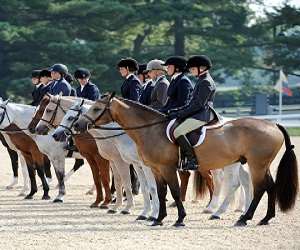Ask horse owners to name their most-feared horse diseases, and chances are equine herpesvirus, or EHV, will be on the list. Recent reports of EHV in Texas, Louisiana, California, and Kentucky serve as a reminder that, with the spring competition season getting underway, it’s important for equestrians to be vigilant and take preventive measures, from vaccination to biosecurity.

The virus spreads from horse to horse through nasal discharge, whether by nose-to-nose contact, aerosol droplets sneezed or coughed into the air, or shared equipment and feed or water. The types most equestrians are most likely to see, EHV-1 and EHV-4, often cause only respiratory illness with few long-term aftereffects, but EHV’s easy movement between horses and the fact that the virus can cause potentially fatal neurological symptoms have made it a serious concern for horse owners and competition organizers alike.
Fortunately, the neurological form of the disease—which is most often associated with EHV-1 and causes a horse to lose coordination to varying degrees—is rare. And there are steps you can take to reduce your horse’s risk, says Dr. Nathan Slovis, director of the McGee Medicine Center at Hagyard Equine Medical Institute in Lexington, Ky. Slovis also noted that while there is a greater awareness and increased reporting of EHV cases, the incidence of the disease is not on the rise.
General Symptoms of EHV
Fever is a key symptom of both EHV-1 and -4, and in some cases it might be the only warning sign, according to the American Association of Equine Practitioners and the Equine Disease Communication Center. But horses can also display other symptoms in conjunction with an elevated temperature. Signs of the infection can include:
- Fever, the single most significant symptom
- Lethargy
- Nasal discharge accompanying fever
- Coughing
- Swelling in legs
- Hind-end weakness or lack of coordination
- Conjunctivitis, or swelling and redness in the pink area at corner of the eye
“They won’t get neurologic without having had a fever,” Slovis said. “They’ll have fevers of 103 to 105 degrees, not a mild fever, but a significant fever. So if there’s a horse with a fever, don’t blow it off, especially if they just came back from a competition. Anyone with a fever should be isolated. The incubation period is 21 days, so if your horse has been exposed, they should spike a fever in a 21-day period. So keep checking their temperatures.
“Now that we have sophisticated testing, we can break it down and identify one strain versus another,” Slovis added. “But the bottom line is that herpes can cause severe illness and severe disease, and I can’t tell you which horse is going to get sick and which horse isn’t, if they have it. Each horse is different, and it depends on things like their immunity, their age, their stress level. Just because a horse has it, doesn’t mean it will come down with neurologic signs, and it doesn’t mean it won’t come down with neurological signs.
Neurological symptoms also can vary in degree, and horses can recover if the neurological signs are mild. “It all depends on the severity,” said Slovis.
The good news, Slovis said, is that the neurologic form of equine herpesvirus is also rare.
What Can You Do To Prevent EHV?
1. Vaccinate.
“For the backyard horse that goes on an occasional trail ride, once or twice a year is more than adequate,” said Slovis. “For the horses that are competing more often, they’re going to need to get it done about every 120 days, about three times a year. That’s a good ballpark: early spring, late summer or early fall and then again in the middle of winter.”
But don’t just think about your horse’s own activities. Consider what the horses around him are doing, too. You may only ride your horse at home, but if his stablemates travel regularly to compete, his exposure risk will be greater.
“If you board at a high-traffic barn, you might have to do the two- or three-times-a-year vaccine program,” Slovis explained. “Your animal won’t be stressed like an animal that travels a lot more, but if there’s intense traffic in and out of that barn, maybe three times a year is good for your horse, too.”
For information on vaccinating your horse against EHV, consult your veterinarian.
2. Plan ahead.
“You don’t want to vaccinate a horse two days before a show. Do it at least seven days before a show and ideally two to three weeks before,” advised Slovis. “Some horses may get sore in the neck area, which is possible with any vaccine, so plan ahead. Some horses may have an active herpes infection and you might not even know, and when you go to vaccinate them their body will react tremendously: the legs will swell up, they’ll get a fever, they’ll feel blasé.”
3. Monitor your horse’s temperature.
Know your horse’s baseline temperature, and monitor your horse’s temperature daily during and after a competition. “A horse with a temperature might act perfectly fine, so taking the temperature can give you a heads-up,” Slovis explained. “It’s good basic information to have.”
Click here to see more...